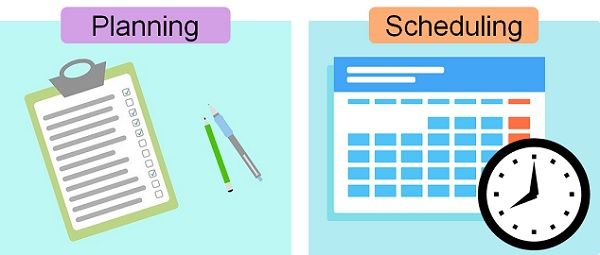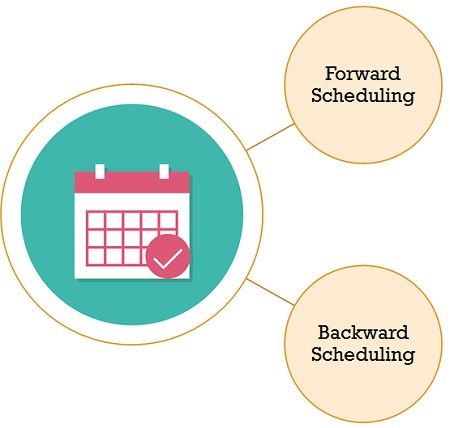 Prior to initiating any work, planning is necessary because when things are well-planned desired results can be achieved. Similarly, for production, planning beforehand is important as it provides us with the parameters to implement control on the activities and suggests if there are any discrepancies. Production planning entails thinking in advance about what to do and how to do something.
Prior to initiating any work, planning is necessary because when things are well-planned desired results can be achieved. Similarly, for production, planning beforehand is important as it provides us with the parameters to implement control on the activities and suggests if there are any discrepancies. Production planning entails thinking in advance about what to do and how to do something.
However, scheduling involves the allocation of resources or production facilities to process work orders. In this, various jobs compete for the limited available resources. So, it is all about the assignment of priorities to those jobs which are more important than others.
Let us dive deep into this concept to understand the difference between planning and scheduling.
Content: Planning Vs Scheduling
Comparison Chart
| Basis for Comparison | Planning | Scheduling |
|---|---|---|
| Meaning | Planning implies the process of developing a guide to design and produce the desired product or service. | Scheduling is the process that states the time frame in which the project will be accomplished, costs in terms of resource requirements and the sequence of tasks. |
| Deals with | What and How | When and Who |
| Relies on | Strategic Planning | Planning |
| Concerned with | Planning is concerned with what actions to be undertaken to achieve the ultimate goal. | Scheduling is all about ascertaining when or how to undertake the activities within the set criteria. |
| Focuses on | Reasoning the consequences of the action to choose among the set of possible courses of action. | Mapping of various sets of tasks to the available resources for a particular time span while satisfying the constraints. |
| Time Horizon | Medium Term | Short Term |
What is Planning?
Production Planning involves the evaluation and ascertainment of resources required in the process of production so as to achieve the intended goal. The resources can be labour, material, machinery, utilities, etc.
Moreover, it is an extensive process of deciding beforehand the activities and actions which are necessary to accomplish the project or production in the desired manner. In short, we could say how the company plan to manage its supply chain, raw materials, employees, machinery, utilities etc.
Further, the planning department of the enterprise takes decisions on each element of the job regarding:
- What task is to be carried out?
- How the task is to be carried out?
- Who is going to carry out the task?
Functions involved in Production Planning
In production planning, a grouping of functions takes place in the following manner:
- Making plans for the design of the product which is about to manufacture.
- Listing out full details and requirements of the products about to manufacture.
- Determining the material quality and quantity to be consumed.
- Making plans for the sequence of operations.
- Planning for equipment capacity.
- Planning for internal material handling, control checks, quality parameter and standards.
Also Read: Difference Between Production and Operations Management
What is Scheduling?
Scheduling implies the process in which we develop a time target for all production operations. It is all about ascertainment of the timing and order of operations in the project and its assembly to determine the total time of its completion.
This includes both set-up time as well as preparation time in implementing a production order in the unit. We use scheduling to plan out the use of factory equipment and resources and also to define processes and purchasing of materials.
So, we could say that scheduling is about deciding the time and date for performing each operation. Along with that, it states the order in which the operations will follow. The planning department of the enterprise is responsible for the preparation of the schedule.
Moreover, as per the type of layout and job like job shop, batch production or mass production, scheduling system techniques differ.
It covers:
- Assignment of job to a particular work centre or machine.
- Time of job assignment and its completion.
- Resource allocation such as manpower and materials.
- Ascertainment of the time sequence of events:
- When the task is going to be performed?
- In what sequence the task is to be performed?
- Reflection of plan
- Feedback and control function to overcome deviations.
Example
Time Table published by the railways provides the actual time at which all the trains start and the time at which they will arrive at different stations and the halting time is Scheduling.
Types of Schedules
- Master Schedules:
This schedule contains the date by which major production items need to complete. In this schedule, we split up the production requirements for each product. On the receipt of any order, first of all, we enter it in the master schedule taking into account the availability of resources. Master Schedule is very helpful for the purpose of advanced planning as it provides details regarding the quantities and delivery timings of the product. - Manufacturing Schedule:
Once the preparation of the master schedule is complete. After that, we will develop a manufacturing schedule. In this, we assign a definite span of time to a particular shop for the production of those products which must be prepared. Also, the day or week by which it should be complete.
Types of Scheduling
- Forward Scheduling: This type of scheduling begins with a predetermined start date. Further, it precedes the first operation to the last operation. This helps in ascertaining the date of completion of the final product. Further, forward scheduling attempts to make the best possible use of the plant capacity by performing mass production at minimum cost.
- Backward Scheduling: It starts with a specified due date and operates in a reverse manner to ascertain the required date to begin and make certain that the production of the finished product is complete by the due date.
Also Read: Difference Between Product and Process Layout
Key Differences Between Planning and Scheduling
The points stated here will explain the difference between planning and scheduling:
- Planning implies the process of thinking in advance about how the product or service is to be manufactured before the actual process of manufacturing begins. On the contrary, scheduling refers to the process of ascertaining the time at which the activities will take place based on the defined duration and previous activities.
- Planning deals with what operations we need to perform and how do we need to perform the operations. Whereas scheduling is concerned with who will perform the operations and when the operations will be performed.
- Planning relies on strategic planning as it states why we perform the production process. Now you must be wondering what is strategic planning? Well, strategic planning is a process of considering the present mission and environmental conditions of the business to set forth a guide for future decisions and outcomes. Conversely, scheduling relies on planning, as it forms the base to organize the tasks in a proper manner.
- Planning is all about what actions the firm needs to perform to attain the ultimate goal. In contrast, scheduling involves determining when or how to perform the activities within the established criteria.
- Planning emphasizes reasoning the outcomes of an action to decide from among the various possible courses of action. As against, scheduling focuses on the plotting of various sets of tasks to the available resources, for a definite period of time while meeting out the formalities.
- The time horizon for planning is medium-term. Whereas the time horizon for scheduling is short term.
Conclusion
All in all, production planning is a significant part of the production system. It is what happens when a company outlines a path to achieve the desired results. Oppositely, scheduling is the activity of rank ordering of the jobs or tasks considering all the resources and them lining them up on the basis of their importance.







Leave a Reply